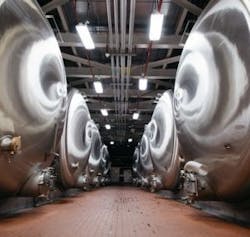Breweries find Energy, Emissions savings switching to next-gen batteryless Steam Traps
Steam traps are a crucial element in manufacturing plants which utilize boilers for heat and process operations.
They remove condensate from the steam pipes and keep the steam within the system. A faulty pipe can cost a manufacturer plenty in energy, emissions and financial expense, not to mention the most important thing, safety.
Beer producer Anheuser-Busch, like many in the food and beverage industry, has struggled with both monitoring the steam traps and replacing them in a cost-effective and timely manner. For those powered by batteries, replacing them can be $500-$1,000 per battery, plus hundreds used up and deposited in landfills every year.
Barkley Edison, steam systems manager with the brewing company, would do a manual audit annually.
“If you go into a single brewery, you might find seven different types of steam trap monitors, all dead, because they required batteries,” Edison said in a story about the project on solutions firm EverActive’s website.
Case Study on Cogeneration plant at Illinois Campus
Bacardi Rum Distillery CHP plant cutting Emissions with shift from Fuel Oil to Propane
Anheuser-Busch operates 12 flagship breweries in the U.S., and steam trap monitoring and renewal is a major issue. The company opted to try a new solution with the battery-less EverActive Steam Trap Monitoring (STM) at its Cartersville, Ga., brewery.
Eventually, Anheuser-Busch deployed the solution on 25 percent of its steam traps. The result, according to the companies was a 1.2-percent reduction in energy use.
Maybe as importantly, they noted, it reduced carbon dioxide emissions by an estimated 7,561 metric tons per year, equivalent to taking more than 1,600 vehicles off the road.
Click here for more on the Anheuser-Busch and EverActive story.
Anheuser-Busch has ambitious near-term sustainability goals. The company plans to source 100 percent of its purchased electricity from zero-carbon renewables and reduce CO2 emissions 25 percent, all by 2025.
About the Author
Rod Walton, EnergyTech Managing Editor
Managing Editor
For EnergyTech editorial inquiries, please contact Managing Editor Rod Walton at [email protected].
Rod Walton has spent 17 years covering the energy industry as a newspaper and trade journalist. He formerly was energy writer and business editor at the Tulsa World. Later, he spent six years covering the electricity power sector for Pennwell and Clarion Events. He joined Endeavor and EnergyTech in November 2021.
Walton earned his Bachelors degree in journalism from the University of Oklahoma. His career stops include the Moore American, Bartlesville Examiner-Enterprise, Wagoner Tribune and Tulsa World.
EnergyTech is focused on the mission critical and large-scale energy users and their sustainability and resiliency goals. These include the commercial and industrial sectors, as well as the military, universities, data centers and microgrids. The C&I sectors together account for close to 30 percent of greenhouse gas emissions in the U.S.
He was named Managing Editor for Microgrid Knowledge and EnergyTech starting July 1, 2023
Many large-scale energy users such as Fortune 500 companies, and mission-critical users such as military bases, universities, healthcare facilities, public safety and data centers, shifting their energy priorities to reach net-zero carbon goals within the coming decades. These include plans for renewable energy power purchase agreements, but also on-site resiliency projects such as microgrids, combined heat and power, rooftop solar, energy storage, digitalization and building efficiency upgrades.

